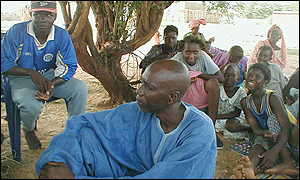| You are in: World: Africa | |||||||||||||||
|
|
Wednesday, 29 August, 2001, 14:54 GMT 15:54 UK
Mauritania's victims of the race divide

Mauritania's refugees feel abandoned in Senegal
By Chris Simpson in northern Senegal
The Mauritanian refugees in Dagana live in small, largely self-made villages. The rains have left the surrounding countryside in this part of northern Senegal looking green and fertile.
But the community elders say this will never be their home. After 12 years in exile following racial violence, the Dagana residents say their needs and hopes have been deliberately ignored. They blame both the governments of Mauritania and Senegal and the UN's refugee agency, the UNHCR, which withdrew assistance to the refugees in 1998. Pogroms About 70,000 Black Mauritanians, mainly from the Pulaar, Soninké and Wolof ethnic groups, were forced south across the border in April 1989.
A border dispute over farming rights brought the governments of Mauritania and Senegal into collision. There were pogroms against light-skinned Mauritanian Moors in Senegal. In Mauritania, many Black Mauritanians were denounced as saboteurs and Senegalese fifth columnists. Amadou Touré was working as a teacher in the Mauritanian capital, Nouakchott, when the violence erupted. 'Executed hundreds' "A lot of people, both Moors and Blacks like myself, did not understand what was happening, but the government clearly wanted to purge the county of non-Moors and the border row was simply a pretext, he said." " It got worse later. The government whipped up a fake coup story and then executed hundreds of Black Mauritanians in the army. I lost two nephews and a brother", Mr Toure added.
Mr Touré is now the head of the camp at Dagana One. He is highly appreciative of the hospitality extended by the Senegalese. "If everybody was as good as the Senegalese have been to us, there would be no problems in the world," he argues. Open country But he paints a dismal picture of refugee life. There is little formal employment available, amenities are modest and most residents get by through selling what produce they can grow in the nearby town.
There are conflicting figures about how many refugees have returned to Mauritania in recent years. Mr Touré suggests there are hundreds rather than thousands and that many of them have found themselves homeless, their property having been confiscated. He urges Mauritanian President Maaouiya Ould Taya to open the country up and engage in a dialogue with disenfranchised black people. 'Racist state' But he emphasises that for him Mauritania is still "a racist state". "There is slavery and they cannot deny it," he says. "Go to a white Moorish household and you will see blacks who are not workers, but slaves". Mr Touré says it is foolish to condemn all light-skinned Moors, saying he knows of many who are engaged in the quest for democracy and human rights. Political movement But at the adjoining camp, Dagana Two, Hamath Amadou Mbodj, is more bitter. "You want to know what went wrong for me in 1989 ?" he shouts.
"My black skin. See here, my skin is black. That's all there was to it." Mr Mbodj says he previously held a prestigious post as a marine and fishing expert in the port city, Nouadhibou. He feels that all light-skinned Moors are racists: "There is not one of them I would trust". Many camp residents openly support the African Liberation Forces of Mauritania (FLAM) an underground political movement. It has, in the past, advocated an armed struggle against the government in Nouakchott as the only way of securing the rights of black Mauritanians. Sole provider Aboubacary Sy came to Senegal 12 years ago as an 18-year-old. He admits he was lucky, going through school and on to university.
Sy now works in an environmental institute in Senegal, but makes frequent returns to Dagana to see his family. "It never fails to make me angry, when I see my people here living like animals. I have to look after 13 people in my family. I am the sole provider". Mr Sy says he is opposed to violence, but says black Mauritanians may have to use force to get their case across. "I think one thing. If in Mauritania, the black man does not behave like in South Africa, we will never have our freedom, our liberty, our independence."
|
See also:
Internet links:
The BBC is not responsible for the content of external internet sites Top Africa stories now:
Links to more Africa stories are at the foot of the page.
|
|||||||||||||
|
Links to more Africa stories
|
|
|
^^ Back to top News Front Page | World | UK | UK Politics | Business | Sci/Tech | Health | Education | Entertainment | Talking Point | In Depth | AudioVideo ---------------------------------------------------------------------------------- To BBC Sport>> | To BBC Weather>> ---------------------------------------------------------------------------------- © MMIII | News Sources | Privacy |
|